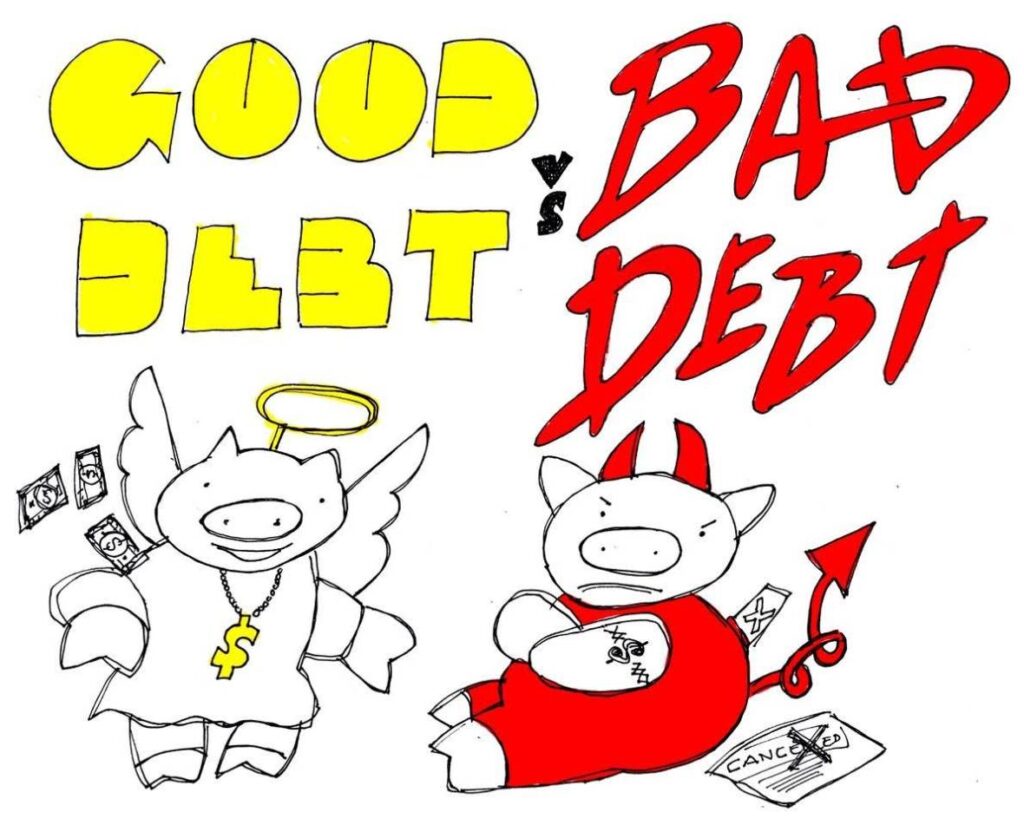Guest article provided by: fundssavvy.com
Strong financial habits can improve your financial health and in turn, your mental health. Financial health means less stress and better mental health, right?
If you stress out about money, you are not alone. Four in ten adults say their personal finances are a major source of stress. That’s according to an Associated Press-NORC Center for Public Affairs Research study.
Here’s some simple financial habits you can start forming to get yourself on the road to less financial stress.

#1 Write Out Your Financial Goals
Whether your financial goals include building up an emergency fund, making more money, growing your retirement savings, making a down payment on a house, becoming debt free or just eliminating credit card debt or student loan debt, there are small steps you can take to achieve your financial goals.
Psychologist James Strickland writes on LinkedIn that one reason a goal may not get completed is because it feels “so large or daunting that we continuously push it off.”
You know you want to achieve financial success, so why does it feel so big? It’s common to feel overwhelmed when setting financial goals.
The key to achieving your goals is breaking them down into smaller, more manageable steps.
This not only makes it easier to stay on track and measure progress, but it also helps you stay motivated by celebrating small wins along the way.

#2 Educate Yourself About Financial Habits
If you’re looking to change your financial situation, it’s important to start with your mindset. A positive money mindset is key to manifesting wealth and success.
Wealth mindset books can help you form the right attitude about money.
Buy them, borrow from a friend, or check them out at the library. Just get going on educating yourself so you can make more informed financial decisions.
#3 Start Saving
Whether you have accounts at a brick and mortar bank or online bank, one of the most important financial habits is to just start saving. Look back at your goals list. Are these long term or short term goals?
Start a saving plan to achieve those goals.
First and foremost, you should have an emergency fund with six to nine months of expenses, in case of, well, an emergency. Anything can happen: medical emergency, loss of job, or … what about a pandemic? You want to be ready for the unknown by having these funds in an account you can easily access.
Are your goals slightly longer term, say six months down the road? Perhaps you want to hold funds in a Certificate of Deposit where you can get a higher rate of return, but not have access to these funds for the agreed upon period of time.
Do you have years before you hope to achieve some of these financial goals? How about investing? This brings us to #4.

#4 Investing
Investing for beginners with little money may seem like an oxymoron. You may think that without money, well…how can you invest money in anything like the stock market, mutual funds, index funds, or anything worthwhile?
However, the reality differs vastly from these common misconceptions.
It may also seem overwhelming with so many different investment vehicles and investment platforms available, as well as investment decisions to make.
It’s time to take control of your financial future one step at a time.
Remember, progress is better than perfection.
You CAN Start Investing
Investing with little money can seem overwhelming, especially if you’re new to it, but rest assured that it’s a lot simpler than you think.
You can actually start investing with as little as $5, or a minimum investment of even less!
With a little bit of knowledge and discipline, you can turn those small investments into a large portfolio over time.
Why You Can Start Investing With Little Money
Starting to invest with little money is not only possible but also quite advantageous.
First, investing small amounts allows you to get a feel for the market’s dynamics without risking substantial capital.
It’s a way to “learn the ropes” while actually participating in the market.
Second, thanks to the power of compound interest, even small, regular investments can grow significantly over time.
Even the smallest contributions can add up and multiply over the long term, building a substantial nest egg.
Lastly, many investment platforms nowadays cater to small investors, offering low initial deposit requirements, fractional shares, and automatic investing options.
This means you can start investing with just a few dollars and gradually increase your investments as you become more comfortable and your financial situation improves.If you can buy a latte, you can invest. Oh and by the way, with proper budgeting, you can do both!
Why Invest?
There are plenty of reasons to start investing. Here are just a few:
- It helps you build wealth and reach financial goals.
- Allows you to save for retirement.
- Can provide passive income through dividends and interest.

#5 Understand Debt and Pay Off Bad Debt
The word “debt” generally has an icky ring to it, right?
Not All Debt is Created Equal
But wait; not all debt in an individual’s financial situation is created equal. Just because you are carrying balances doesn’t mean it’s all bad.
There are actually two types. When navigating financial independence, it’s crucial to know how to differentiate between the two.
Bad Debt: What Is It?
When you are looking to manage debt, it is not just about having too much.
As its name suggests, it negatively impacts your financial health. It is typically defined as debt incurred to purchase depreciating assets or things that do not generate long-term income or increase in value.
Good Debt: What Is It?
This is a type of debt that can actually benefit you in the long run. Sounds crazy, right?
Some examples include educational loans like federal student loans, mortgages, or small business loans.

#6 Know Your Rights as a Taxpayer
With money and income comes, yep, taxes. The tax code is a two way street. One of the most important financial habits is to understand your rights as a taxpayer.
The IRS Taxpayer Bill of Rights serves as a beacon of protection, ensuring that taxpayers are treated fairly and justly throughout the tax process.
These rights delineate the responsibilities of the IRS and safeguard the interests of taxpayers.
As a taxpayer, you have the right to be informed, obtain quality service, pay no more than the correct amount of tax, challenge the IRS’ position and be heard, the right to appeal an IRS decision in an independent forum, finality, privacy, confidentiality, retain representation, and a fair and just tax system.
What Now?
If personal finances are stressing you out, remember you are not alone.
Research shows 51% of adults say their personal finances stress them out.
Adopting good financial habits can help you take control of your personal financial health and improve your mental health. Imagine feeling good about money instead of worrying about it.
Celebrate your small wins. You just finished this article and now you are on your way!
Illustrations by: Vincent Marchica

